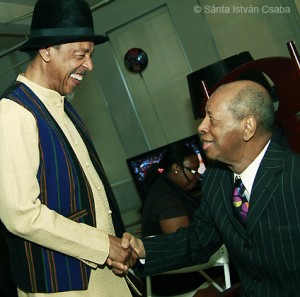The Pulitzer Prize for Music has been earned by Henry Threadgill, composer, bandleader and reedist, for his expansive and in-depth explorations of polyphonic improvisation with his quintet Zooid, the suite stretching over two cds In for a Penny, In for a Pound. Big time congratulations! And encouragement listening to all and any of Henry’s works, as he is a visionary, exciting American composer.
For instance, Threadgill’s even newer Ensemble Double Up has recently issued its premier recording, Old Locks and Irregular Verbs,  a triumphant dedication to his great friend, the late Butch Morris. I reported on that music upon its first performance in January 2014 and a performance in Oakland, and find it a marvel. I am not alone.
Here’s my  brief report with photos on Zooid from 2010, when I wrote a longer article about Threadgill’s new intervallic concepts for composition for DownBeat. Hmmm, that DownBeat piece is not online — I will post it, complete, elsewhere.

One Pulitzer Prize winner to another: Henry Threadgill, l., with Ornette Coleman (at Coleman’s birthday party, 2012)
Followers of Threadgill’s 50+ year career (yeah, I) will attest he deserves this honor for a lifetime of original music, starting even before and apart from his Chicago-born trio Air (RIP, Fred Hopkins and Steve McCall), including extraordinary collaborations with AACM composer-performers including especially Muhal Richard Abrams and Roscoe Mitchell, alliances and/or allegiances with all the colorful, gutsy, bluesy, rootsy, thinking-peoples’ adventurers including Ornette Coleman, David Murray, Diedre Murray, Olu Dara, Craig Harris, Pheeroan ak Laff, Reggie Nicholson, Andrew Cyrille, Asha Puthli, Brandon Ross, Bob Stewart, Curtis Fowlkes, Myra Melford, Bill Laswell, Sly and Robbie, John Hicks, Cassandra Wilson . . .
. . the list goes on and on as does Threadgill’s music, always identifiably his, always spirited though he can be (in his writing writings for ensemble as well as his personal playing of alto flute and flute, alto and less often tenor or baritone sax) aridly chilling, terse, sardonic, thorny, prophetic, demanding and demonic as well as engaging, seductive, hilariously celebratory, heart-pure, wildly imaginative, philosophical and unbound.
One may reasonably question the fundamental premise of arts prizes and awards — the innate elitism and patronage implied by conferring esteem from on high, and such initiatives are indeed complicated, arguably even compromised, from the start (I say this while presiding for 20 years over the Jazz Journalists Association’s annual Awards for music and media, currently in process). However, when a creative artist such as Henry Threadgill, a restless force unto himself for decades presenting unique expression in every conceivable, daring musical form, gains acclaim from a panel of judges (in this case, composers Julia Wolf, of Bang on a Can, and William Banfield, Berklee; Dallas Morning News classical critic Scott Cantrell, Wesleyan U Center for the Arts director Pamela Tatge and jazz violinist Regina Carter) authorized by their own musical accomplishments as well as by the Pulitzer powers that be), no wag of a finger is as appropriate as a tip of the hat. Hear, hear, Henry, hear, hear. Here: Very Very Circus; here: You Know The Number.
